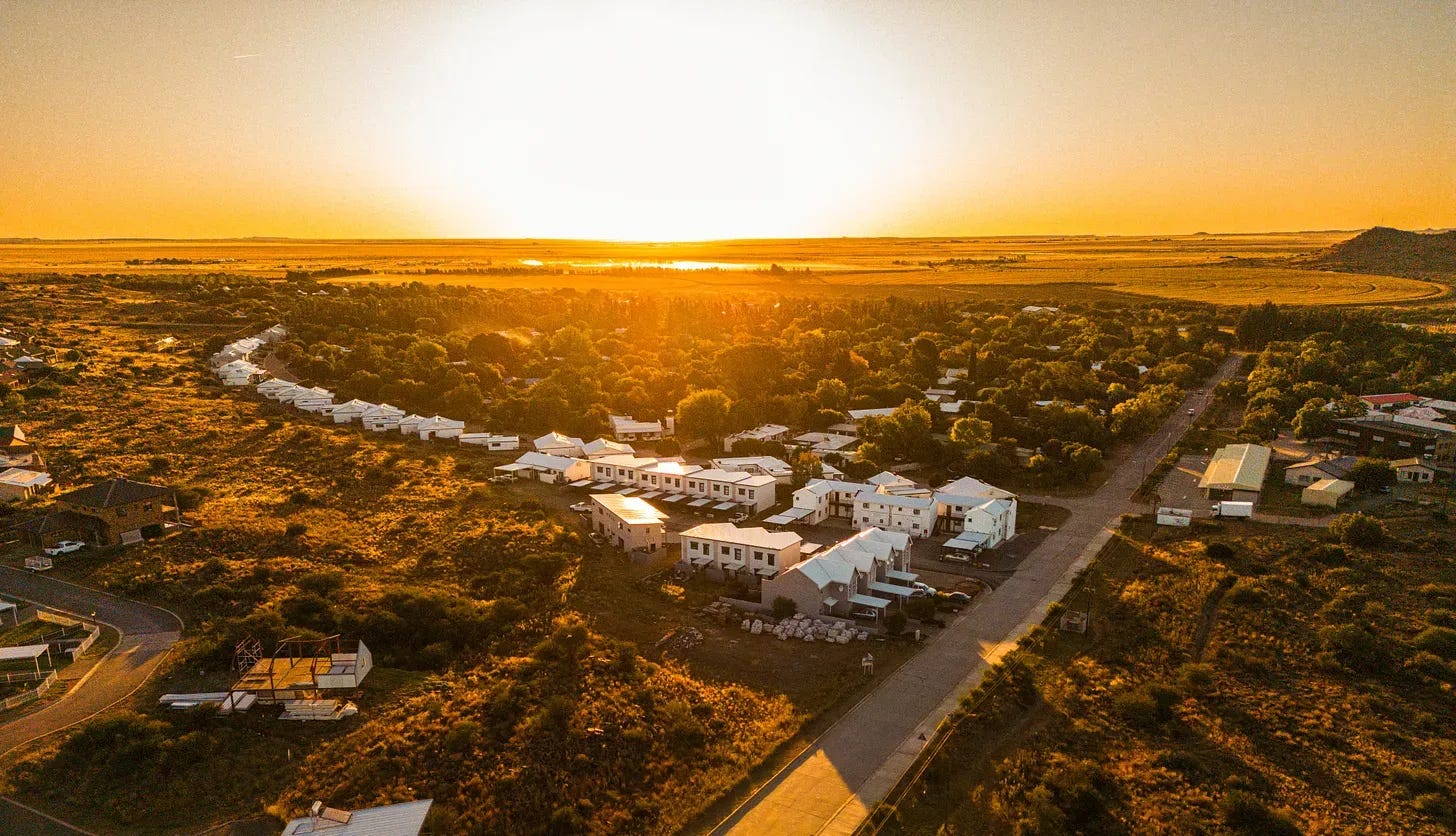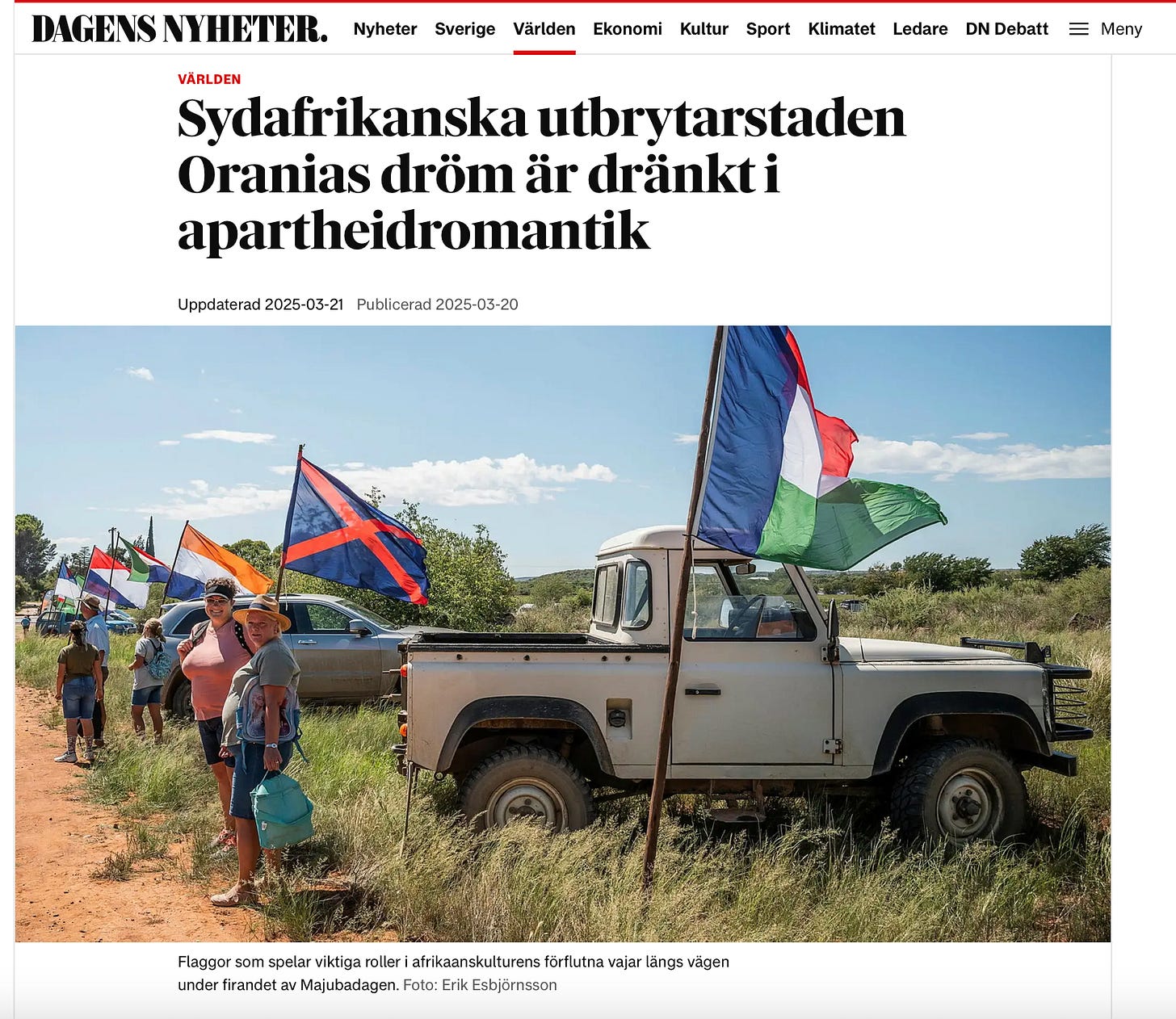Dagens Nyheter (DN), one of Sweden's major newspapers and a flagship of the Swedish liberal establishment, recently published an article about Orania titled "South African breakaway town Orania's dream is steeped in apartheid nostalgia." This piece demands a response, not just for its inaccuracies but for what it reveals about Western media's approach to any community that challenges multicultural orthodoxy.
What strikes me first when reading the text is the casual simplification and hostility that characterizes it. I'm hardly surprised – I've seen this type of journalism around Orania countless times. The pattern is as predictable as it is intellectually dishonest: Western journalists arrive with conclusions already drawn, spend a cursory amount of time seeking confirmation of their prejudices, and deliberately ignore any evidence that might complicate their narrative.
DN, which ironically coined the term "agenda-setting journalism" in Sweden, exemplifies this approach. Their coverage says far more about the ideological constraints of Swedish media than it does about the reality of Orania. The journalists aren't there to understand – they're there to reinforce a worldview that their readers have been conditioned to accept without question.
In this newsletter, I want to address some of the most striking claims made by DN and offer a more nuanced picture of both Orania and the South African situation.
A "Living Mausoleum of Apartheid"
This is a rhetorical construction without substance, intended to discredit. Orania was founded by people seeking a peaceful and independent solution to the demographic situation in South Africa. Calling it a "mausoleum of apartheid" demonstrates fundamental misinterpretations about both Orania's origins and purpose.
Orania is a project about self-determination, cultural survival, and voluntary association. It's a place where Afrikaners can work to preserve their culture, language, and traditions by creating a future on their own terms. This has nothing to do with apartheid – it's about the right to cultural and economic independence in a country where they struggle as a minority.
DN References "Far-Right Circles"
This is a classic guilt by association used to dismiss and demonize. Saying that "X evokes admiration among the far-right" is a recurring trick to avoid discussing substance. It's the same type of argument as saying "Hitler liked dogs, so if you like dogs..." – an intellectually dishonest position.
Orania is a peaceful little village with people building their own future through hard work. Their successes should be judged on their own merits – not by creating artificial associations with "far-right circles." Interestingly, Orania attracts people from across the political spectrum who are interested in decentralization, local governance, and cultural survival.
The project can be seen as a model society for how a minority can create a secure future. These are values that are politically neutral.
Why Do Media Like DN Blame Apartheid Instead of the ANC?
This is perhaps the most interesting question that touches on the very core of the problem. The ANC has governed South Africa for 30 years now – a generation has grown up without experiencing apartheid. Yet apartheid is still used as an explanation for the country's poor management.
I believe this is due to several factors. It fits the Western European left-liberal worldview to explain all problems in terms of historical oppression rather than contemporary corruption and incompetence. Acknowledging ANC's, ergo the Rainbow Nation's, failures would mean questioning certain fundamental assumptions about multiculturalism. The narrative of South Africa as the "Rainbow Nation" where democracy solved all problems is too emotionally satisfying to abandon. Many Western journalists who actively supported the fight against apartheid find it difficult to accept that their heroes in the ANC have proven to be the very monsters they claimed to be fighting against.
On Violence Against White Farmers
DN's claim that white farmers' vulnerability "lacks support in statistics" is simply false. It rather shows a troubling unwillingness to investigate the subject properly.
There's a reason why no "official statistics" exist – the South African government stopped specifically registering farm attacks as a separate crime category in 2007, effectively making the problem invisible in official statistics. This was not a random decision but a deliberate attempt to hide a sensitive issue for the establishment.
This is why Afrikaner civil rights organizations like Afriforum have had to step in to document these attacks on their own. Their annual reports show a systematic pattern of violence that cannot be dismissed as "anecdotal."
I've personally done several reports on farm murders and have met victims' families, spoken with survivors, and visited the places where these terrible acts of violence took place. You can see one of these reports [here]. The brutal reality behind the statistics is something you never forget after witnessing it up close.
Secondly, it's not just the number of attacks that's relevant but also the nature of these attacks. Many farm attacks are characterized by extreme violence and torture that goes far beyond what's "necessary" for robbery or theft. This indicates a hate or terrorism element that's important to understand.
This hatred is further reinforced by the open hate rhetoric tolerated against the white minority. When tens of thousands of people gather to sing "Kill the Boer" (Boer is the term for the white minority) at political meetings and this passes with close to no criticism from both the South African establishment and international media, it becomes obvious that a double standard exists. Most recently, just the other day on the South African holiday Human Rights Day, the EFF again sang about killing the Boer.
Imagine the scenario where similar genocidal incitement would be directed at any other ethnic minority anywhere in the world – the international condemnation would be immediate and massive.
But when it comes to white South Africans, they are not only met with silence from Western media but with active diminishment and denial in their reporting. Newspapers like DN not only choose to ignore this hate rhetoric – they actively work to redefine it, explain it away, or even deny its existence. The hatred against the white minority is ignored because it doesn't fit into the established narrative.
This active denial from media like DN constitutes, in practice, an acquiescence to continued violence – an indirect legitimization of the forces that continue to direct violence against white farmers.
My Final Word About DN
The purpose of DN's article is to reinforce an already established worldview where white South Africans are portrayed as privileged and bearing historical guilt, while black South Africans are victims of historical injustices. This simplified narrative also serves a political purpose in Sweden – to support a certain type of identity politics and the promotion of multiculturalism, which is already standing on shaky ground.
Successful examples like Orania are uncomfortable for the establishment because they serve as a living reminder of what we had before multiculturalism was introduced – of the cohesion and security we've lost. Orania demonstrates that homogeneous societies are well-functioning, productive, and peaceful, which creates a stark contrast to the recurring mantra that diversity is both enriching and a strength.

There's a fear among our establishment that people will start longing for what we once were. If Swedes begin to ask the question "What did we have before we gave it away?" Orania becomes not just a small, distant village in South Africa – it becomes a concrete demonstration of an alternative to the prevailing ideology. Therefore, Orania must be demonized and dismissed as an "apartheid mausoleum" rather than recognized for what it really is: a functioning example of cultural self-preservation in an increasingly globalized world.
It's therefore not surprising that DN uses its space to problematize a peaceful little town with a few thousand inhabitants, rather than critically examining a government whose corruption, incompetence, and racial laws are destroying the future prospects for all South Africans.
The truth is that Orania, with all its challenges, represents something many people around the world seek: the possibility to live among like-minded people, preserve their culture, and build a future on their own terms. That this is seen as controversial says more about DN's ideological blinders than about Orania itself.
If you want to read more about Orania, I recommend my book "Orania: Building a Nation."
And if you appreciate my work, please consider becoming a paying subscriber:
Or you can contribute to my work with a Bitcoin donation. Press the button below to view my Bitcoin address:
Best regards,
Jonas Nilsson






Thank you for your writing. I live in Los Angeles- I discovered your writing after a news story about the electricity issues and load shedding in SA. I became interested in what life is really like there under these conditions and discovered short videos about Orania on YouTube. The citizens of Orania strike me as incredibly resourceful, inspiring, bold and action oriented. I wish them peace, freedom and prosperity.
Tack Jonas. Utmärkt svar på Dagens Nyheters skitreportage